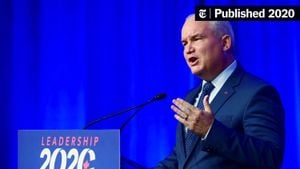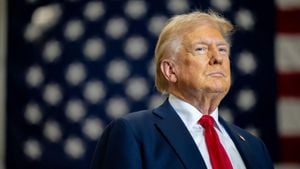Donald Trump’s announcement of Robert F. Kennedy Jr. as his pick for Secretary of Health and Human Services (HHS) has created ripples of concern among health experts, parents, and public health advocates. Kennedy, known for his skepticism surrounding vaccinations and public health policies, is set to face significant scrutiny due to his controversial stance on vaccines, which may impact how they are regulated and perceived if he is confirmed.
Historically, Kennedy has raised questions and concerns about vaccines, often promoting unfounded claims about their safety. His appointment could potentially reshape the country's public health strategy, especially concerning vaccination policies. Many are asking: What could Kennedy do if he takes the helm of HHS, and what powers would he actually have?
During his tenure as HHS secretary, Kennedy would not possess unilateral authority to ban vaccines outright, as some alarmist social media posts have suggested. His powers are intertwined with existing laws and the framework established by various health agencies, including the Centers for Disease Control and Prevention (CDC) and the Food and Drug Administration (FDA). Nevertheless, his influence could be broad, especially with the ability to appoint key figures within these organizations.
Health policy experts have pointed out several significant areas where Kennedy might exert his influence:
- Oversight of Vaccination Protocols: Kennedy would oversee the CDC and other agencies responsible for vaccine guidelines, including the Advisory Committee on Immunization Practices (ACIP). This committee recommends which vaccinations should be covered under federal programs like Medicaid and Medicare. Kennedy could utilize this power to steer vaccine recommendations and potentially reshape public health messaging around vaccination.
- Control Over Funding: While Kennedy cannot directly cut funding for HHS programs targeting vaccinations, he could influence budget requests and priorities during congressional negotiations, potentially redirecting resources away from vaccination initiatives.
- Changing the Narrative: The HHS secretary could affect public perception of vaccines through strategic communication. For example, Kennedy could instruct the CDC to alter how vaccination risks and benefits are presented, which may impact parents' decisions about vaccinating their children.
Despite these possibilities, Kennedy’s avenues of action come with many hurdles. Federal vaccination laws are strict, requiring comprehensive evidence for any vaccine to be evaluated for safety and effectiveness. Experts have emphasized the formal procedural requirements involved, such as the rigorous evaluation safety reviews conducted by the FDA, which would likely pose challenges to any efforts by Kennedy to roll back vaccination measures.
Critics of Kennedy's potential confirmation have voiced their concerns loudly. Monica Bertagnolli, director of the NIH, remarked during congressional hearings, “Discouraging vaccination would result in more severe illness and death, particularly among children.” Her comments reflect the fears many have concerning Kennedy's agenda.
Another point of concern stems from Representative Robert Garcia, who called the nomination “f—— insane,” citing Kennedy’s history as “a vaccine denier” and predicting disastrous consequences for public health infrastructure. These opinions highlight the bipartisan apprehension prevalent among lawmakers and public health officials alike.
The appointment has also prompted fears among parents worried about their children's health appointments. Would vaccines still be readily available should Kennedy succeed? While experts agree he cannot legally remove vaccines from approval, some worry about his potential influence on accessibility. For example, Kennedy might remove emergency use authorizations for certain vaccines, which would limit access for certain age groups.
Some believe his influence could lead to informal pressures on vaccination. If, as suggested, Kennedy makes changes to the CDC's communications without formal recommendations, the subtle shift could discourage vaccinations, impacting public perception significantly.
One of the most salient takeaway points is how Kennedy's administration could challenge existing vaccine protocols through appointments of key health agency officials sympathetic to his views. Such appointments could create massive shifts within the CDC and FDA, giving more weight to anti-vaccine sentiments within key health frameworks.
Still, as disconcerting as his potential actions are, experts assert there are significant challenges to overcome. Any concerted effort by the Kennedy-led HHS to substantially alter vaccine policy would inevitably draw legal challenges. Federal courts have established protections and frameworks governing public health interventions, which would likely be engaged should there be attempts at sweeping changes.
Many anticipate significant pushback from both professional health organizations and lawmakers dedicated to public health. Pharmaceutical companies and health advocates accustomed to advocating for vaccination and preventive health measures may lobby against any such moves by Kennedy’s administration, pushing back against proposed rollbacks on vaccines.
Both allies and opponents of Kennedy’s potential nomination recognize the importance of safeguarding public health through vigilant oversight of such influential health positions. The coming months will likely see feverish discussions and calls for action surrounding public health policies and vaccine protocols.
Given the contentious atmosphere surrounding his nomination, Kennedy's confirmation hearing will serve as not just another round of political wrangling but also as a pivotal event for public health discourse across the nation. What remains clear is the transformative impact his nomination could have on health policies and public trust in vaccines – one of the cornerstones of public health strategy for decades.
Whether Kennedy will ever act upon the influence he could wield remains uncertain, but the discussions around his nomination highlight the continued struggles over vaccination policies and public health amid divided opinions on science and safety.



